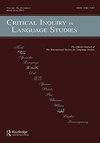Flunking the Spanish test: Television portrayals of personal responsibility and language shift in heritage learners
引用次数: 0
Abstract
ABSTRACT The language practices of Heritage Learners (HLs) of Spanish are frequently regulated and stigmatized in academic and community settings when their Spanish is perceived as deficient. By ignoring institutional structures that accelerate Spanish loss, the “inadequacy” of Latinxs’ Spanish is regularly perceived to be the fault of individuals or families. This study examines language ideologies that emerge in popular television shows for pre-teens (i.e. tweens), revealing that HLs are regularly portrayed as failing Spanish in academic settings and unable to complete everyday communicative tasks in Spanish. When their lack of Spanish is woven into the narrative of a sitcom problem, the resolution of these conflicts leads youth, parents, and grandparents to reflect on their individual responsibility to maintain the language and culture, which reinforces a neoliberal ideology of family responsibility for language maintenance.西班牙语考试不及格:传统学习者的个人责任和语言转变的电视形象
摘要:当西班牙语传统学习者的西班牙语被认为有缺陷时,他们的语言实践在学术和社区环境中经常受到监管和污名化。由于忽视了加速西班牙语流失的制度结构,拉丁裔西班牙语的“不足”通常被认为是个人或家庭的错。这项研究考察了青少年(即青少年)流行电视节目中出现的语言意识形态,揭示了高年级学生在学术环境中经常被描绘成西班牙语不及格,无法用西班牙语完成日常交际任务。当他们缺乏西班牙语被融入情景喜剧问题的叙事中时,这些冲突的解决会让年轻人、父母和祖父母反思他们维护语言和文化的个人责任,这强化了一种新自由主义的语言维护家庭责任意识形态。
本文章由计算机程序翻译,如有差异,请以英文原文为准。
求助全文
约1分钟内获得全文
求助全文
来源期刊

Critical Inquiry in Language Studies
Arts and Humanities-Language and Linguistics
CiteScore
5.30
自引率
0.00%
发文量
23
 求助内容:
求助内容: 应助结果提醒方式:
应助结果提醒方式:


